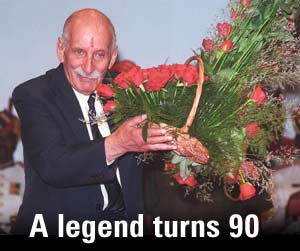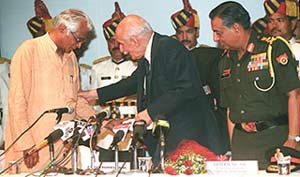
In the company of generals, children, politicians, journalists and illustrious members of the global Parsi community and with traditional Zoroastrian rituals, Field Marshal Sam Hormusji Framji Jamshedji Manekshaw, India's first and only living field marshal, celebrated his 90th birthday in New Delhi on Thursday.
Manekshaw, his legendary wit and charm intact, cut his birthday cake with a silver khukri, the favourite dagger of the legendary Gurkha soldiers, as the large gathering sang Happy Birthday to You.
The hero of the 1971 war with Pakistan, which resulted in the birth of Bangladesh, made no speech at the evening function organised by the Parzor Foundation, a UNESCO-supported initiative for the preservation and promotion of Parsi Zoroastrian culture and heritage. But he was visibly overwhelmed by the gathering and its affection.
Defence Minister George Fernandes, Tourism Minister Jagmohan, the three service chiefs, numerous retired war heroes and several former service chiefs were present at the function.
Fernandes pointed out that Manekshaw "not only created history, but also created a nation."
Everyone who knew Manekshaw had a tale or two to recollect, as the crowd gathered to share some delightful Parsi snacks.
Manekshaw, who almost lost his life during World War II in Burma and won a Military Cross for bravery, was the first Indian officer to command the Gurkhas after Independence.
A documentary -- In War and Peace: The Life of Field Marshal Sam Manekshaw MC -- was screened as the Parzor Foundation celebrated his life as a mark of the contribution of the Parsi community to India and a celebration of India's multi-culturalism. The documentary, which has India's favourite soldier narrating his life to his grandson Jehan, details his legendary career.
Delhi's military circles has been abuzz for the last week with anecdotes of the exploits of Sam Bahadur, as Manekshaw was known to his troops.
In 1962, in the midst of the humiliating defeat against China, Manekshaw took over the Tezpur-based 4 Corps and famously told his troops, 'Gentlemen, there will be no more withdrawals.'

In 1971, he prevailed upon Prime Minister Indira Gandhi to give him six months to wait out the monsoon and prepare for the invasion of East Pakistan, bulldozed the finance ministry to give the military extra funds, and skipped major cities to take Dacca and create Bangladesh.
Despite his age, Manekshaw did not disappoint Delhi on this visit. On Wednesday, at the Battle Honours Mess, he was at his witty best as he quipped, "Officers, you have kept up the great tradition of the India Army... [pause] of having beautiful wives."
When the wife of a former army chief asked Manekshaw how he managed to remember the first names of most army wives, the field marshal remarked there are two things no honourable man should forget: His wife's birthday and the first name of the women around.
The field marshal now lives in the Nilgiri Hills in south India, looked after by a loyal Gurkha family.







